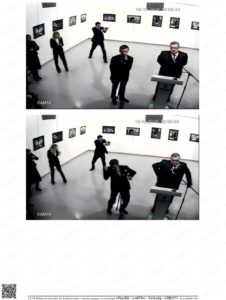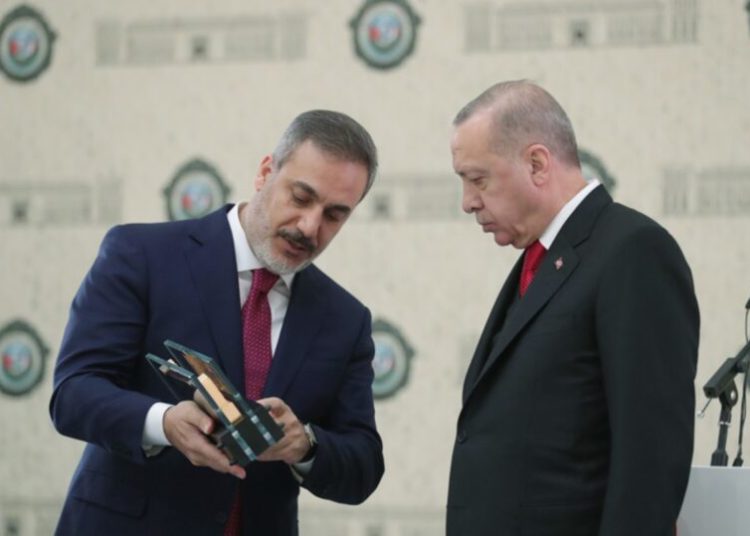Abdullah Bozkurt/Stockholm
Turkish intelligence agency MIT helped a prosecutor who investigated the assassination of a Russian ambassador and set up a false suspect to deceive a Russian delegation that was scheduled to visit Turkey for a fact-finding mission into the murder of Russian Ambassador to Turkey Andrei Karlov by a radicalized police officer in the Turkish capital.
The scheme was apparently designed to derail the probe and divert Russian authorities’ attention away from the evidence that in fact pointed to elements in the government of President Recep Tayyip Erdoğan and Turkish al-Qaeda cells. The revelations about the plot were made in a court hearing on September 4, 2020 by a victim who was abducted and tortured by the intelligence agency.
The 38-year-old victim, Hüseyin Kötüce, had been tortured for months to extract a false confession and was then turned over to the prosecutor’s office for arrest before the Russian delegation came to Turkey. The delegation was to meet with Turkish prosecutors, police chiefs and intelligence officials to review the evidence collected on Mevlüt Mert Altıntaş, the 22-year-old Turkish police officer who gunned down the Russian ambassador on December 19, 2016, as well as his associates and accomplices in the crime.
“I told Adem Akıncı [the investigating prosecutor] that you’re trying to place me in the Karlov murder case, but you know that I had nothing to do with it. The prosecutor said: ‘Hüseyin, I can’t do anything for you. There’s a delegation from Russia coming in this week, and I have to arrest you. There’s a lot of pressure on me. You take the stand in court and [try to] clear your name there’,” Kötüce told the panel of judges at the Ankara 2nd High Criminal Court.
Kötüce was working for the government’s Information Technologies Institution (BTK) as an engineer responsible for electronic document administration. He was abducted by the intelligence service at a staged traffic checkpoint in Ankara on February 28, 2017. He was locked up in a cell in an unidentified location and tortured there for three months in complete disregard of due process and a blatant violation of Turkish law.
Court transcript that shows testimony given by Hüseyin Kötüce:
He was told he had to sign a fabricated statement MIT had prepared so that government critic and Erdoğan opponent the Gülen movement would be incriminated in the murder. “During this three-month period, I was subjected to all kinds of torture including beatings, sleep deprivation and forced standing for 18 hours a day,” he said according to court hearing transcripts obtained by Nordic Monitor.
To make the scenario plausible, an arrest warrant was issued for him on March 7, 2017 as if he were a fugitive, when he was in fact held incommunicado at a black site maintained by Turkish intelligence. His family filed a missing persons report when he failed to home from work on the day of his abduction; yet, Turkish authorities launched a terrorism probe into him in absentia and police raided his home as well as the homes of his parents and father-in-law.
MIT then turned him over to the counterterrorism police at 21:00 hours on April 25, 2017, and a record was created as if he had gone to the police station of his own accord to confess his crimes. No mention was made of his abduction and the torture by MIT he endured. He was also held in police detention for 35 days during which time a statement already dictated by MIT agents was fine-tuned by the police. He had no access to his lawyers or family while in police detention, either.
Police first took him to prosecutor Alparslan Karakaya, who mocked him and asked him where he had been for three months as his family was looking for him. “I said: ‘Mr. Prosecutor, I’ve been tied up for three months and blindfolded, with a bag over my head. I didn’t see anything, but you know very well where I was all this time. Please don’t insult my intelligence.’ The prosecutor said exactly the following in the presence of a bar-appointed female lawyer; ‘Hüseyin, I don’t approve of such things [done by MIT], but they happen within the state apparatus, nevertheless. We can’t prevent such things’.”

As he agreed to sign the false statement and declared his intention to repent as instructed, he was released under judicial supervision at his arraignment on June 1, 2017. He feared MIT would take him back for another torture session if he explained what he went through and how he was threatened. Kötüce thought he was in the clear. On December 20, 2017 prosecutor Akıncı took a new statement from him as a witness in the Karlov case. However, a day later, a detention warrant was issued for him, changing his status from a government witness to a suspect. At his arraignment on January 4, 2018, he was formally arrested and jailed.
Having realized that signing the false confession and repeating the government narrative would not save him from being a scapegoat in the murder of Karlov, an assassination in which he had no role whatsoever, he eventually decided to tell the truth about what really happened after his abduction and how he was forced to agree to false statements under duress.
On September 4, 2020 Kötüce told the panel of judges everything and testified that there was not a single piece of evidence the prosecutor submitted in the indictment that linked him to the murder. He noted that the prosecutor made up a scenario about the murder with no supporting evidence and connected him merely on false statements extracted from others also under torture. He was alleged to have obtained confidential information from a MIT agent about the Russian ambassador’s security detail and passed it on to the killer. Yet, the allegation did not hold up to scrutiny during the hearings as witnesses recanted their statements and the government failed to present any evidence to support the claim.
Falsified police record that alleged Kötüce turned himself in when he was in fact handed over by intelligence agency MIT after a long detention:
However, his cry for justice did not reach beyond the walls of the courtroom as he had already been sentenced in the pro-government media, which branded him as an accomplice in the murder as part of the Erdoğan government’s propaganda machine. Officials in Ankara held the view that if they kept repeating the same lies both publicly and in media outlets and incorporated false allegations in the indictment, Russian investigators would be thrown off the track. This, they thought, would also help hush up the real leads that pointed to elements in Turkish government institutions that created a permissive climate for a police officer to gun down a high-profile ambassador in the most secure part of the Turkish capital.
When he finally had the opportunity to make his case in court after a long pre-trial detention, Kötüce refuted the prosecutor’s allegations one by one in his well-prepared defense statement and poked multiple holes in the indictment.
He also highlighted the fact that not a single lawyer who represented interests of the Russian Federation attended the trial hearings because he said the Russians didn’t believe the charade put on by the Turkish government.
Kötüce filed multiple motions to review the evidence and cross-examine witnesses, but they were denied by the court:
“Why doesn’t the Russian government send a lawyer here if it really believes the people here are [real] suspects. There’s no lawyer from Russia. You know why this is the case: because the Russians don’t believe in these courts. They know very well that the people here are not suspects. They don’t believe [what the Turkish government alleges],” Kötüce testified.
The cell phone records, bank wires and computer logs obtained for Altıntaş as well as witness statements all pointed to several radical clerics who either worked for the Turkish government’s religious authority, the Diyanet, or were long supported by the office of President Erdoğan. The assassin’s links to Turkish al-Qaeda cells were completely ignored by the prosecutor, who instead indicted scapegoats, allegedly linked to the Gülen movement, a group that is opposed to the Erdoğan government, on fabricated evidence and forced false confessions.
The prosecutor’s claims collapsed when the trial started during which key defendants recanted their earlier statements extracted from them under duress and submitted medical reports to prove they endured torture and ill-treatment until they agreed to sign false statements. Many government witnesses either did not show up for cross-examination despite repeated motions from defense lawyers and defendants. Those who appeared in court provided conflicting statements, while some recanted earlier statements they had given to the police.
In the case of Kötüce, he filed six motions to the court to summon MIT agents to the hearings for cross-examination in order to verify allegations and review the alleged evidence, but the judges denied his requests. He asked the court to question government witnesses who provided statements against him to the police, but that request was denied as well. His motions on other aspects of the case that would have allowed him challenge the evidence presented and clear his name were all denied.
Turkish authorities issued an arrest warrant for Kötüce when he was abducted by the intelligence agency and kept unlawfully at a black site and tortured.
Frustrated with the lack of a fair trial, Kötüce said the following in his testimony: “What else can I do? Should I admit to a crime I didn’t commit, Your Honor? Will that provide justice? To prove I have nothing to do with this murder, I filed motions to shed light on the allegations against me. Every time I filed a motion, the prosecutor requested that it be rejected. I didn’t list the witnesses there [in the indictment], you [the prosecutor] did. I did not present the evidence in the case, you did. If they are [solid government] witnesses, I should be afraid. But rather, you are scared [to present the witnesses for cross-examination]. If the evidence is against me, I should be afraid, but again you’re scared [of reviewing the evidence in the hearings].”
Kötüce also recalled a reported statement incorporated into the case file made by the slain ambassador on December 10, 2016 when he landed at the airport. Karlov called the embassy upon arrival in Turkey, informed them of intelligence about a possible terror threat against the embassy and its staff and ordered a lockdown. Kötüce asked why the Turkish government hadn’t spoken with Russia about the terror organization that was planning an attack against Russian diplomats in Turkey. He accused the prosecutor of covering up the evidence in the murder and of not trying to find out the real masterminds who radicalized the Turkish police officer who gunned Karlov down.
There are a number of pieces of evidence in the case file that show the killer was in fact radicalized by jihadist literature, attended prayer circles organized by pro-government jihadist cleric Nurettin Yıldız and had been befriended by known al-Qaeda militants. However, the government did not pursue the leads into jihadist networks and did not investigate al-Qaeda figures who worked with the killer. It was also revealed that the Erdoğan government rewarded the killer with 34 bonuses in two years’ time.












